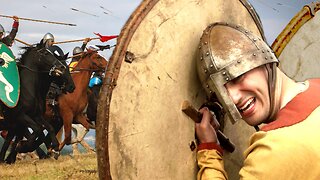Premium Only Content

What is the Key Difference Between Islam and Christianity?
A sidewalk conversation with Ibrahim, a Muslim from Egypt, quickly led us past our secondary differences such as our different traditions and practices. Instead, we focused on the main source of contention between the two faiths: Jesus’ true nature.
Islam views Jesus as one of its great prophets, and may accept Jesus as a son of God in the sense that we are all “sons of God”. But it would reject the notion that God could have a biological son. “But the Bible teaches that Jesus is much more than another being created by God” I explained. “It teaches us that in the beginning, before creation, God had already existed forever. He has no beginning or end, and Jesus has always existed with Him. Jesus exists with God as the Creator, not just a part of the creation.”
Ibrahim said that while he respects the teachings of Christianity, he questions how we could believe that God is “One” as Islam emphasizes. “How can you say you believe in God the Father, the Son and the Holy Spirit, yet that you also believe in just one God?”
I tried to give him several analogies that might better explain this concept, but also let him know that all analogies have limitations. Each leaf on a three-leaf clover may represent one person of the Trinity, but the limitation is that each leaf is obviously not the whole plant. Water may take thee different forms in solid, liquid, and gas, but only one at a time. People may take on different roles such as husband, son, and parent, but each “role” can’t relate to each other as Father, Son, and Holy Spirit do.
Ibrahim then asked a great question, which helped explain the problem – “If you work for a company, and this company has three different bosses, one day they are going to fight each other.” It reminded me of the problem with the Greek pantheon of gods. Zeus, Apollo, Artemis, Dionysus and the rest may have provided great drama for Greek myths and legends, but in the end they were really only man’s very flawed attempt at relating to the divine.
The Greek gods couldn’t live together in perfect peace, but what if two or three immortal beings did exist in absolutely perfect agreement, with no hint of a difference of opinion between them, wouldn’t you say they are perfectly united as one being? Aren’t our differences of opinion and of will the things that separate us as independent people?
From descriptions of interactions throughout the biblical record, we understand that among the persons of the Trinity there are different roles but only one will. The Father, Son, and Spirit have all acted in perfect harmony with one another – even through the most difficult test of all – Jesus’ crucifixion and resurrection.
Ibraham related the criticism that I have heard from many atheists – “What Father would abandon his own son to such horrible suffering and death as Jesus endured on the cross?” They like to watch Christians squirm as we wrestle with the apparent contradiction between biblical values and the Father’s neglect and abandonment of His only Son.
But if we have a proper understanding of the Trinity, this apparent contradiction doesn’t have to threaten the foundation of our faith. We need to understand it to be a great paradox – that is, something that may look to our untrained mind like a contraction, but that rather requires a much greater depth of understanding than our minds are capable of. Just because we don’t understand something doesn’t mean it isn’t true.
So, because of the perfect unity between them, God the Father could seek the glory of God the Son through His victory over suffering and death, and God the Son could seek the glory of God the Father through his perfect obedience to Him, all brought about through the perfect orchestration of God the Holy Spirit. Really, though, I can’t begin to do justice to the depth of the perfect union of the Trinity, and it is way beyond our tendency toward selfish and broken relationships for us to be able to understand if I could.
The Bible teaches us that Father, Son, and Spirit not only exist in perfect harmony, but that they have done so for eternity past. Because of the Trinity, God reconciles fallen man to himself – “to be just AND the one who justifies” as described in Romans 3. For its part, Islam is left with Allah, a god who must exist alone for all eternity, and who must either compromise his love and justice and settle for a very flawed system of justice based on human efforts at reconciliation.
It was good for Ibrahim and I to look past the differences between our religious traditions, and I appreciated his open mind and friendliness. But as much as we had in common, our view of Jesus’ identity as one person of the Trinity is one difference that neither of us can afford to overlook.
-
 11:51
11:51
Alabama Arsenal
13 hours agoThe Silent Sledgehammer | GQ Armory 8.6BLK Paladin
1521 -
 2:21:11
2:21:11
Nerdrotic
16 hours ago $32.44 earnedDown the Rabbit Hole with Kurt Metzger | Forbidden Frontier #090
157K26 -
 2:41:13
2:41:13
vivafrei
21 hours agoEp. 251: Bogus Social Security Payments? DOGE Lawsduit W's! Maddow Defamation! & MORE! Viva & Barnes
271K298 -
 1:19:23
1:19:23
Josh Pate's College Football Show
14 hours ago $4.85 earnedBig Ten Program Rankings | What Is College Football? | Clemson Rage| Stadiums I Haven’t Experienced
76.4K1 -
 13:22:09
13:22:09
Vigilant News Network
19 hours agoBombshell Study Reveals Where the COVID Vaccine Deaths Are Hiding | Media Blackout
123K63 -
 1:17:59
1:17:59
Sarah Westall
15 hours agoDOGE: Crime & Hysteria bringing the Critics & the Fearful - Plus new CDC/Ukraine Crime w/ Dr Fleming
117K15 -
 45:39
45:39
Survive History
21 hours ago $11.03 earnedCould You Survive in the Shield Wall at the Battle of Hastings?
97.6K7 -
 1:50:28
1:50:28
TheDozenPodcast
20 hours agoViolence, Abuse, Jail, Reform: Michael Maisey
125K6 -
 1:10:50
1:10:50
Weberz Way
14 hours agoJAIL TIME FOR HOGG?, GOOD BYE DEEP STATE, & LEFTEST PROTEST
170 -
 46:08
46:08
Vedic compatability astrology
12 hours ago"Coffee & Consciousness: Kingpins with Anya – Kundalini, Face Yoga & Quantum Healing"
89